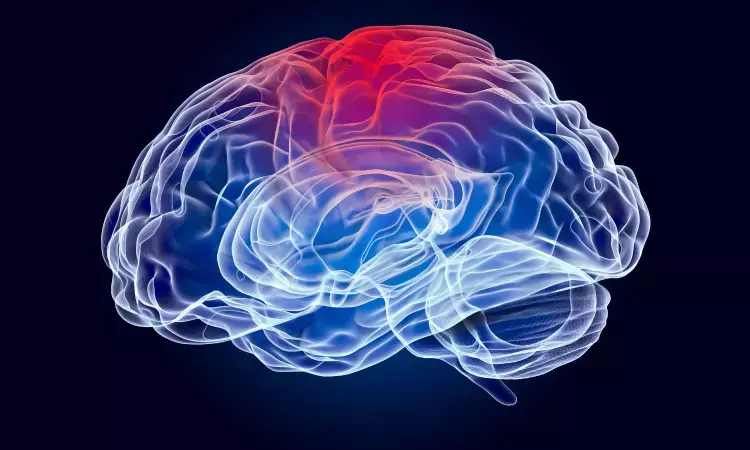- Home
- Medical news & Guidelines
- Anesthesiology
- Cardiology and CTVS
- Critical Care
- Dentistry
- Dermatology
- Diabetes and Endocrinology
- ENT
- Gastroenterology
- Medicine
- Nephrology
- Neurology
- Obstretics-Gynaecology
- Oncology
- Ophthalmology
- Orthopaedics
- Pediatrics-Neonatology
- Psychiatry
- Pulmonology
- Radiology
- Surgery
- Urology
- Laboratory Medicine
- Diet
- Nursing
- Paramedical
- Physiotherapy
- Health news
- Fact Check
- Bone Health Fact Check
- Brain Health Fact Check
- Cancer Related Fact Check
- Child Care Fact Check
- Dental and oral health fact check
- Diabetes and metabolic health fact check
- Diet and Nutrition Fact Check
- Eye and ENT Care Fact Check
- Fitness fact check
- Gut health fact check
- Heart health fact check
- Kidney health fact check
- Medical education fact check
- Men's health fact check
- Respiratory fact check
- Skin and hair care fact check
- Vaccine and Immunization fact check
- Women's health fact check
- AYUSH
- State News
- Andaman and Nicobar Islands
- Andhra Pradesh
- Arunachal Pradesh
- Assam
- Bihar
- Chandigarh
- Chattisgarh
- Dadra and Nagar Haveli
- Daman and Diu
- Delhi
- Goa
- Gujarat
- Haryana
- Himachal Pradesh
- Jammu & Kashmir
- Jharkhand
- Karnataka
- Kerala
- Ladakh
- Lakshadweep
- Madhya Pradesh
- Maharashtra
- Manipur
- Meghalaya
- Mizoram
- Nagaland
- Odisha
- Puducherry
- Punjab
- Rajasthan
- Sikkim
- Tamil Nadu
- Telangana
- Tripura
- Uttar Pradesh
- Uttrakhand
- West Bengal
- Medical Education
- Industry
New concussion headset may monitor when it's safe to return to play: JAMA

UC San Francisco researchers have designed a new digital headset to measure alterations in brain function which could change decisions about how quickly an athlete is ready to return to play after a concussion.
In an evaluation of the device researchers found it revealed brain changes even in athletes whose concussion symptoms had gone away, suggesting they could be playing too soon.
Although not yet approved by the Food and Drug Administration (FDA), the device could fill an important niche among athletes, clinicians, trainers and coaches, who are concerned about the long-term effects of repeated sports-related concussions. These include chronic traumatic encephalopathy, Alzheimer’s and Parkinson’s diseases.
The headset-patented by UCSF and licensed by MindRhythm, a medical technology company-picked up changes in what the researchers call “headpulse,” which are subtle forces exerted on the skull as the heart contracts.
The researchers observed how the device performed on 101 young adults playing Australian Rules Football, who had experienced 44 concussions. Results appeared Aug. 11, 2023, in JAMA Network Open.
On average, the changes detected by the headset lasted 12 days longer than the players’ symptoms.
“We found a mismatch between symptoms and changes in biometrics recorded by the device,” said Cathra Halabi, MD, of the UCSF Department of Neurology and the Weill Institute for Neurosciences, who is the first author of the study. “This raises concern about relying on symptoms for return-to-play decisions. Delays could be recommended for those symptom-free athletes if head pulse abnormalities persist.”
Researchers said the headset should be used in conjunction with medical expertise.
“We believe that it can provide critical objective biometric measures that can be used by athletes and medical professionals to decide when to return to play,” said senior author Wade S. Smith, MD, PhD, chief of the UCSF Neurovascular Division and co-founder of MindRhythm. “The headset is also used to monitor athletes afterward to ensure measures remain in the normal range.”
Concussed Brain at Risk if Physical Activity Resumed
Playing sports with concussion puts the brain at increased risk of damage. “There is a rare condition called second impact syndrome, where a soon-after second concussion can cause near immediate brain death,” Smith said.
More commonly, playing sports with concussion may result in an increased risk for subsequent brain injury, due to symptoms like delayed reaction time, impaired balance or vision.
“Recurrent concussions in close succession can lead to more debilitating symptoms that last longer, keeping athletes out of the game,” Halabi said.
While the headset was tested in young adults, its use eventually may be expanded to minors. MindRhythm is hoping to acquire FDA approval within one year, said co-founder and chief executive officer John Keane. “The plan is to make the technology available to the medical community, with the most likely areas of interest being sports medicine physicians and concussion clinics,” he said.
Athletes with concussion may be able to record their own biometric measurements, the researchers noted. Clinicians or athletic trainers would monitor the data remotely and provide guidance on when it is safe to resume sports and other physical activities.
Reference:
Halabi C, Norton L, Norton K, Smith WS. Headpulse Biometric Measures Following Concussion in Young Adult Athletes. JAMA Netw Open. 2023;6(8):e2328633. doi:10.1001/jamanetworkopen.2023.28633.
Dr Kamal Kant Kohli-MBBS, DTCD- a chest specialist with more than 30 years of practice and a flair for writing clinical articles, Dr Kamal Kant Kohli joined Medical Dialogues as a Chief Editor of Medical News. Besides writing articles, as an editor, he proofreads and verifies all the medical content published on Medical Dialogues including those coming from journals, studies,medical conferences,guidelines etc. Email: drkohli@medicaldialogues.in. Contact no. 011-43720751


